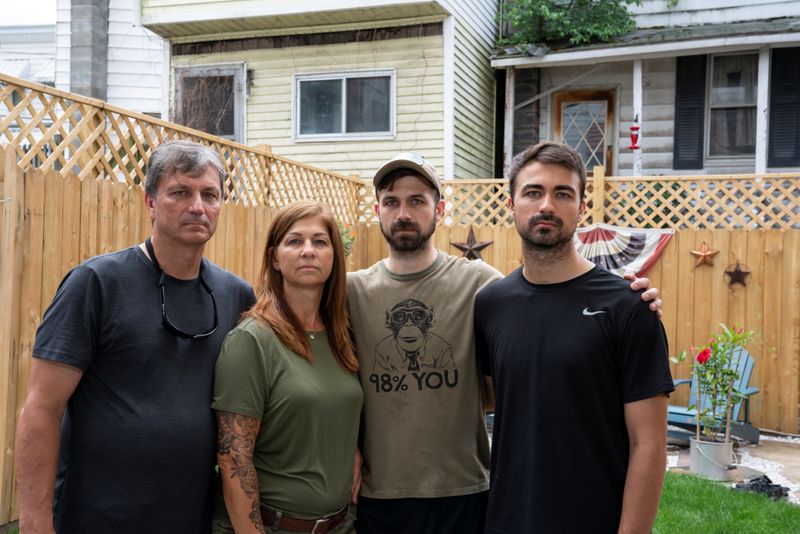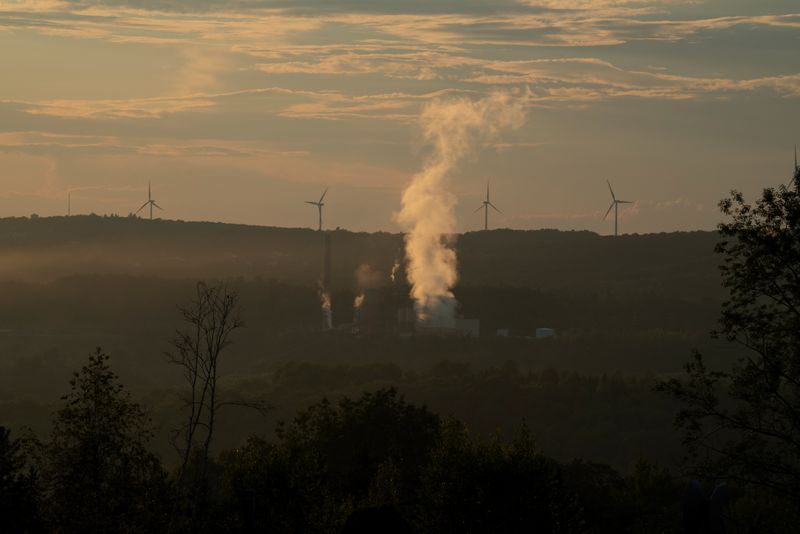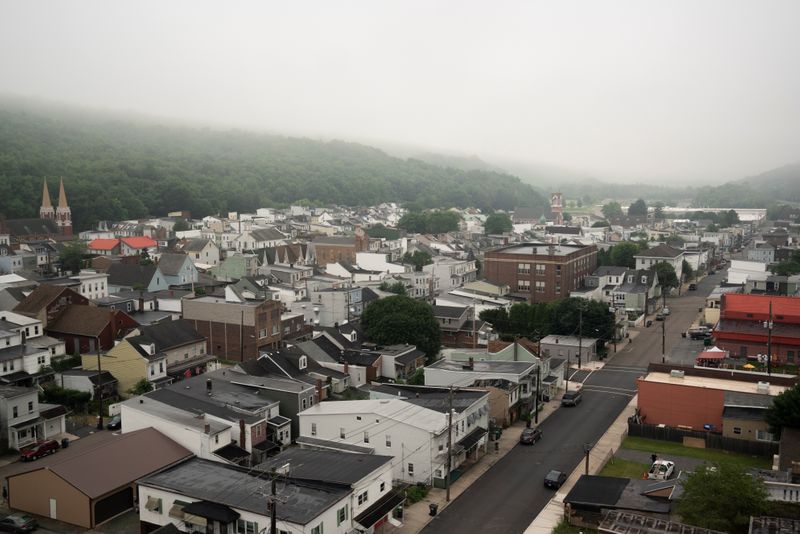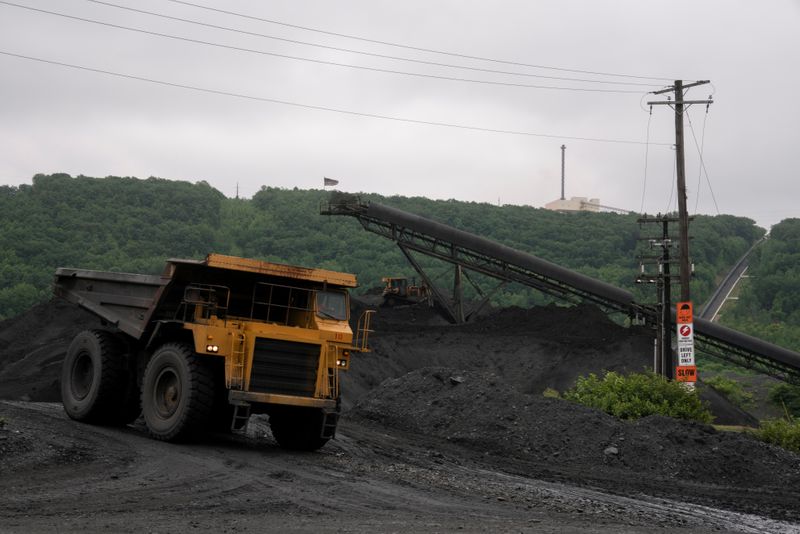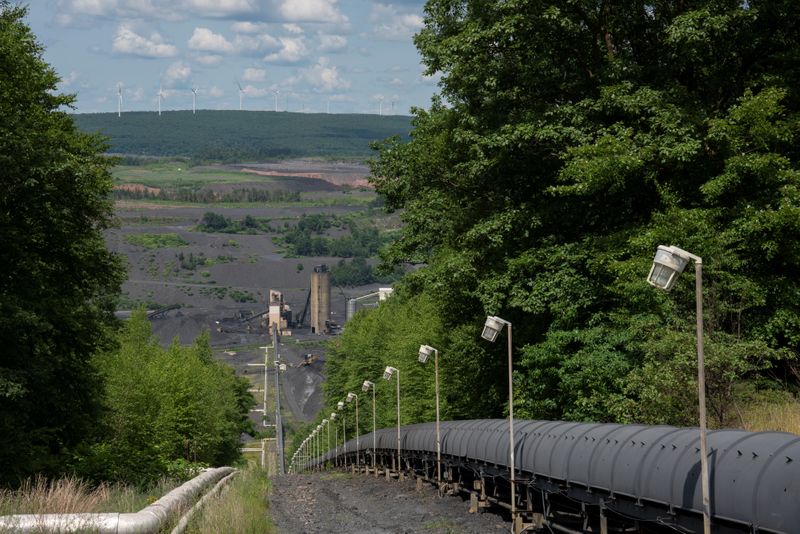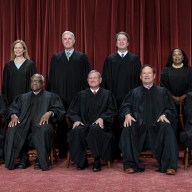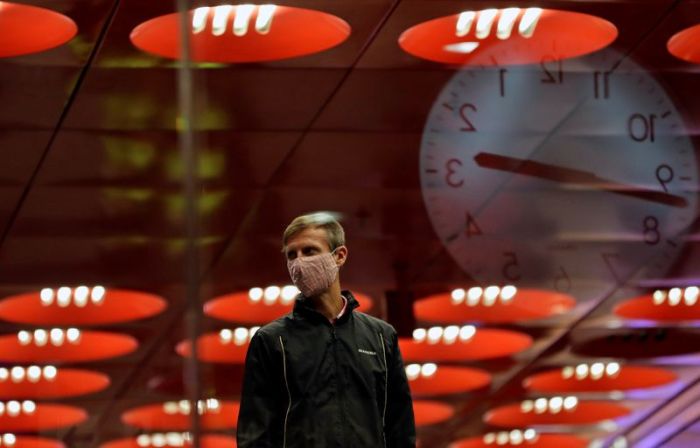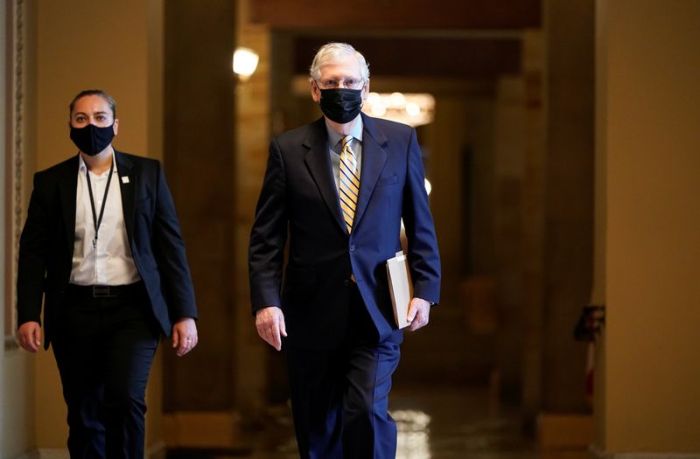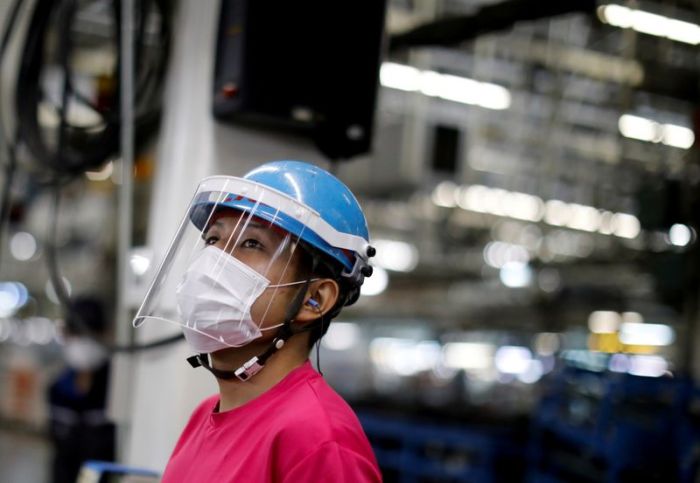MAHANOY CITY, Pennsylvania (Reuters) – Mike Gaval looks out from the Gilberton coal-fired power plant down the valley to Mahanoy City, the town he grew up in, and up the hill to the wind turbines spinning on the horizon.
Gaval would be the last person to call himself a coal critic. For 30 years, he’s worked at the plant, which supplies power to the local prison and the grid; before that, his grandfather was a miner who blasted massive seams of anthracite and brought it to the surface.
His hometown is a place made, and unmade, by anthracite, the coal that fueled the Industrial Revolution, provided heat for millions in sprawling cities, spawned rail networks and still heats homes in Mahanoy City. Trucks carrying anthracite and its byproducts constantly run back and forth through town, coating the old row houses that line the main street with a layer of gray dust.
But the glory days of coal are long gone, and Gaval wrestles with its legacy in heating not just homes and boilers, but the planet.
“With climate change and how the industry I work in is contributing to that, it could be somewhat of a struggle, especially if you have kids. It makes you wonder: Are you doing the right thing?” said Gaval, 56, a husband and father of two sons. “But on the other hand, people have got to work. And for people in this area, this has been their whole life.”
The two generations of the Gaval family, Mike and Cindy and their sons, Justin and Michael, are woven into the fabric of Mahanoy City. Both Mike and Michael played on the high school football team, the Golden Bears. Today Michael volunteers as a coach, but he dreams of leaving, if he can whittle down a mountain of student debt.
Cindy is from Shenandoah, 10 minutes away, and has recently returned to work sorting goods at an Amazon warehouse near here after taking months off to protect the family during the coronavirus pandemic. Justin took a job at a plastics plant after driving gun trucks down ancient alleys in Afghanistan while serving in the Army Reserve.
But even though they’re deeply rooted in Mahanoy City, they’re also a minority in this region: voters who didn’t support Donald Trump in 2016 and who won’t vote for the Republican president in November, in a town where Trump signs sprout everywhere and no Joe Biden signs are to be seen, even though the Democratic nominee for president grew up in another blue-collar town, Scranton, an hour away.
This year, the country almost seems at war with itself, over politics and the coronavirus pandemic, race and the economy, climate change and energy. Far from the streets of protest and the halls of power, the Gavals nonetheless find their lives intersecting with this moment of American crisis from Mahanoy City, a small town that gets smaller every year.
This is the story of an American family and an American town, both struggling with what they once were – and what they will be.
A TOWN IN DECLINE
Mahanoy City, a grid of row houses, many crumbling, used to bustle. It took off during the Civil War when demand for anthracite soared. Soon after, the abundant work the mines offered, no education necessary, brought waves of Irish, Welsh and Lithuanian immigrants. Eventually the town boasted an Opera House, a brewery and more than 120 bars.
A century ago, the population tipped 16,600. Now, it’s less than 4,000 – and falling. The thriving shops and saloons have been replaced by Dollar Generals and Family Dollars and a smattering of bars that take turns being open on different nights because of the low demand. Until it was demolished a few years back, the abandoned Kaier brewery loomed over the edge of downtown, its broken windows and moldering interior a haunting symbol of the town’s decline.
Several row houses surrounding the Gavals’ home are collapsing. The sons and Mike keep teasing Cindy that they should buy them up. But Cindy figures that all they have to do is wait for them to fall down or get to the point where they will have to be demolished, then get them for next to nothing.
Cindy, 54, said she doesn’t talk politics in this town in Schuylkill County where 70% of voters went for Trump in 2016, even though Trump won Pennsylvania by only a little over 1 percentage point four years ago and now faces a tough challenge from Biden. Polls of Pennsylvania voters show the former vice president leading Trump by about five percentage points.
“There’s a lot of Trump lovers,” she said about the people she works with, most of whom she counts as pals. “And we don’t agree on it, so I don’t say nothing, or we’d get at it. I’ll throw a little dig here and there about Trump because I don’t like him. But it is what it is. There’s nothing I’m going to do to change it. So you just got to kind of go with the flow.”
Michael, 26, was an all-state quarterback, rushing for 30 touchdowns and passing for 12 in his final high school year. But that wasn’t enough to get a free ride through college; after graduation he had $115,000 in loans, more than four times what his parents’ home is worth.
He lives with Mike and Cindy, working for the Pennsylvania Department of Aging, helping to oversee probes into abuse and neglect of seniors – work that got a lot tougher when the coronavirus pandemic brought face-to-face inspections to a halt. He hopes to cut enough debt to move to Florida or North Carolina one day with his fiancé, Kattya Palacios, who is also loaded down with student loans.
Justin, 33, lives 10 minutes away in neighboring Frackville and works 12-hour shifts at a factory that makes fibers from superheated plastic. The fibers are used in things like disinfectant wipes and face masks; business has been good during the pandemic. But it’s also a job without much room for advancement.
When he got out of the service, he worked for six months at a state-run juvenile detention center, but after the mental and physical stress of serving in Afghanistan, he had a hard time dealing with arguments with the kids there. He also worked at a steel plant, where he admitted to voting for former President Barack Obama, and “I was called the N-word lover. So, I mean, that’s like openly out on the shop floor at work.”
Justin thought about working for a superstore, but the job didn’t offer health insurance right away. Then he found the plastics plant, which offered insurance from day one. Although many workers in the United States earning higher pay take health insurance for granted, getting a job with insurance can be difficult; only 49% of Americans receive employee-sponsored health insurance, according to the Kaiser Family Foundation.
On climate change, he’s like his dad. “We both think that taking care of the environment is an important part of what our society should be doing today,” he said. “We know that it’s doing bad things to our environment.”
Justin, who says he thinks “humanity’s facing a crisis,” worries about giant plastic graveyards in the oceans and his role contributing to it, but he also realizes the demand for the factory’s products is unlikely to drop anytime soon.
“I understand that on a personal level I can’t do anything to change that; this has to be a huge governmental policy,” he said. “It has to be tackled on that level, or else nothing’s going to matter, in my view.”
DOWNWARD SPIRAL FOR COAL
One day Mike walked around town with Michael and Kattya, talking about growing up in a town that was falling down around them.
They stopped at some wooden steps that led up a hillside to an old brick building, its windows and doors boarded up, “Mahanoy Area” in big black letters above the entrance. Mike said it was the middle school he went to, but it had long been abandoned.
On the main street, a poster advertised the annual meat raffle fundraiser poster in the window of the Mahanoy City Elks Lodge, an elegant building that used to be a theater.
When he was young, Mike tried college but never settled on a major and dropped out. Afterward, he was working at a grocery in town when Cindy got pregnant. He needed better pay, so he sought work at a breaker, which smashes coal into chunks to heat homes and businesses, and then heard about work at the coal power station. Since Mike has been at the plant, coal has gone from powering half of U.S. electricity to less than a quarter.
Despite Trump declaring that the regulatory “war” on coal is over, coal plants keep shutting and U.S. coal output last year fell to its lowest level since 1978.
Mike, a longtime fan of U.S. space missions, first heard of global warming from James Hansen, the NASA scientist who testified before Congress about the threat of climate change back in 1988. “When I saw his name with NASA, that sort of gave it a little air of credibility, I would argue.”
He began to worry about how his work was contributing to the problem.
“I could always say I was just a small piece of the puzzle. But then if everyone says that, that’s the whole puzzle,” he said. “Hopefully I didn’t do too bad, screw it up too much.”
Meanwhile, market dynamics are getting worse for coal. Natural gas is plentiful, and Pennsylvania is a top producer of the fuel. Costs for solar and wind power are falling. Besides looming regulations on coal plant emissions after the Trump era, coal has other costs. Its plants need frequent maintenance, and the constant stream of ash they produce must be taken away and disposed of.
The region’s other coal plant shut recently, but Mike expects the Gilberton plant, where he does everything from working the control room to the ash unloader, to keep running for the foreseeable future. The plant runs on culm, basically the waste that’s left over from anthracite production. There are black mountains of culm all over the region, hundreds of thousands of tons left over from more than a century of mining.
Cindy has often thought they could move somewhere else and seek other opportunities. But Mike is content with Mahanoy City, his family and friends. He might not agree on politics with a lot of people in town, but he finds that eventually they help one another out, no matter their views.
“You just try and split the divide between what you feel is right and wrong and try and find common ground,” he said.
Instead of dwelling on today’s troubles, he prefers to have faith in the next generation to make progress.
“If you look at the history of almost any country, you are going to go through those types of times,” he said. “I think eventually they will move forward with it all, and come out, I think, in a better spot.”
(Reporting by Timothy Gardner and Dane Rhys; editing by Kari Howard)

